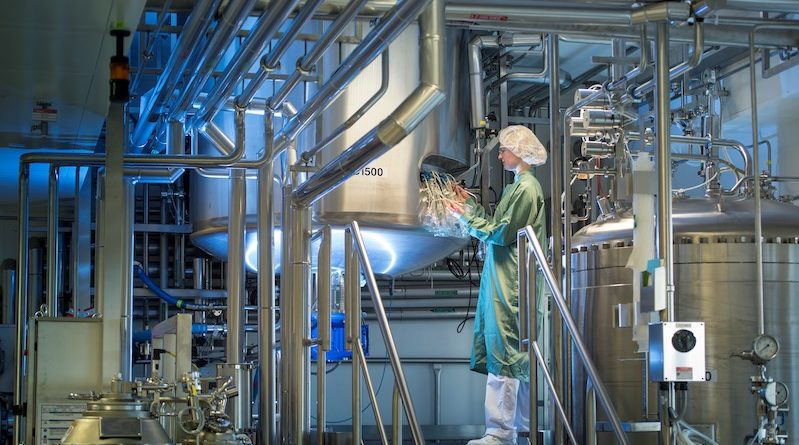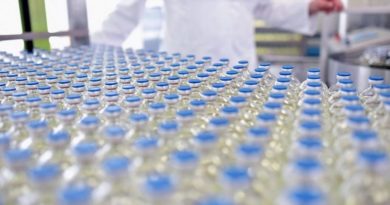
Strengthening European resilience in the manufacturing and supply of medicines
The COVID-19 crisis has brought many long-standing questions about pandemic response to the fore across all sectors. For the pharmaceutical industry, it has put the capacity of systems to supply essential medicines and vaccines under enormous pressure. One of the most important lessons learned is that Europe must strengthen its manufacturing capacity and supply of strategic assets, such that critical products are available at all times to secure the health of its population. While European Commission President Ursula von der Leyen called for a stronger “European Health Union” in her State of the Union speech to the European Parliament on September 16, the European Council conclusions of October 1-2 stressed that “Achieving strategic autonomy while preserving an open economy is a key objective of the Union”.
Strategic autonomy is really about mobilizing resources so that the region does not uniquely depend on the decisions and assets of others.
It should enable Europe to shape economic and political power through its global industrial competitiveness.
Sanofi has a unique position in Europe. We are a global pharmaceutical company with a robust R&D footprint and a uniquely diversified industrial network throughout the world -with expertise in the production of Active Pharmaceutical Ingredients (APIs), medicines and vaccines-, a strong European heritage, and headquarters in France. Europe is home to 35 of our 69 industrial sites and six of our 18 distribution centers, and the internal expertise of our full value chain, from manufacturing to supply, is a core part of our company identity.
As the largest pharmaceutical company headquartered in the European Union, Sanofi is well placed to help support Europe’s industrial strategy and autonomy. Based on our company’s recent experiences, we have identified three priorities to achieve this goal.
1 – Strengthen Europe’s health autonomy through increasing regional manufacturing and supply capacity
The pandemic has amplified the call for stronger European capacity to secure supply and safe access to essential medicines for all patients. In this regard, the crisis has underscored the effectiveness of Sanofi’s core strengths, for example its sustainable approach to industrial strategy.
Sanofi’s production sites are located around the world, in more than 30 different countries, linked to local and regional ecosystems, and wholly integrated. While our European facilities produce medicines and vaccines primarily for Europe and our Asian facilities primarily for Asia, we have the capacity to supply other regions and the flexibility and adaptability required to weather any crisis.
Our model demonstrates that leveraging regional “sovereignty” without compromising the smooth functioning of global supply chains is key to reinforcing European industry.
Almost 70% of our APIs are produced in Europe. Maintaining 35 sites in Europe has been a strategic choice which had a double ‘cost’ for Sanofi: compliance with high standards and regulations, and challenging pricing decreases. Governmental measures have contributed to pharmaceutical disinvestment in Europe, which had short-term benefits but, 15 years later, appears to be challenging for European health autonomy, with India closing borders and supply disruptions in China.
In February 2020, Sanofi stepped up its efforts to balance the heavy reliance of European-based industry on APIs sourced from Asia. While it is unrelated to COVID-19, we announced our decision to create a leading European company dedicated to the production and marketing to third parties of APIs. Headquartered in France, the new standalone company will combine our API commercial and development activities with six of our European production sites, located in Italy, Germany, the UK, Hungary and France. The new company will produce APIs for Sanofi, with the goal of expanding sales to other pharmaceutical companies in future. This is one approach to strengthening API manufacturing and supply capacities, commensurate with regional needs. The company is also working on an APIs catalog and will play a strategic role there. We do not consider that everything that went to China and India must be repatriated to Europe. Yet, spreading out the production of these ingredients so they are less concentrated in China and India is critical for meeting the needs of patients in Europe and beyond.
The resilience of Europe’s pharmaceutical industry and, by extension, its public health, demands a detailed understanding of its manufacturing dependencies.
Manufacturing capacity must be increased strategically, based on a comprehensive list of priority APIs and medicines and where they are currently produced.
In addition, while investment in new manufacturing efforts in Europe will contribute to regional resilience, new access and procurement approaches are needed to create the right financial incentives to invest in manufacturing in Europe. The location of production has an impact on cost and will need to be considered in pricing medicines.
Ultimately, adequate incentives, regulatory and financial measures should support production capacity in Europe to facilitate the supply and avoid shortages of critical medicines. This applies to the manufacturing of APIs but also to the biotechnology transformation. To achieve more health autonomy, Europe must be strong in all areas: the production of chemistry-based drugs, vaccines and cutting-edge biopharmaceuticals.
2 – Strengthen Europe’s global competitiveness in advanced biopharmaceutical manufacturing
Current industry projections indicate that by 2030, half the global pharmaceutical market will be biopharmaceuticals (up from 20% today); biologics are increasing their market share by around 2% every year. Europe would do well to catch up and build much stronger leadership in this highly innovative, strategic sector. Establishing a more attractive environment for science and technology will help Europe generate more breakthrough technologies and compete at a global level. Transforming its industrial activities toward bio-production could con- tribute to this goal, at the same time providing highly skilled jobs, reducing environmental impact, and increasing the security of supply.
Sanofi has put its weight behind these objectives, investing heavily in transformation, focusing on biologics-based therapies and dedicating one billion euro annually to modernizing our industrial network.
Recent investments focus on ramping-up our biopharmaceutical production capacities and expanding our digital capabilities.
We announced our latest initiative in June 2020. We invested more than 500 million euros to creating a state-of-the-art vaccine production site and a new vaccines research center in France. These new facilities will empower us to be flexible and agile so that we can respond quickly to future pandemic risks. While most industrial sites are equipped to produce one vaccine at a time, our Evolutive Vaccines Facility will have fully digital production modules to enable the simultaneous production of three to four vaccines. This represents the kind of step change needed across the pharmaceutical industry, not only in Europe but worldwide.
The dialogue with and support from the French government were pivotal to this strategic investment, which supports a shared goal of strengthening Europe’s healthcare and ability to be prepared for health emergencies. To expand such efforts to the European level will require substantial financial commitment, for example funding for cutting-edge manufacturing technologies like those applied in the Evolutive Vaccines Facility. Europe must become attractive in terms of access to innovations, with drugs that will be sold at the right price and adequate market conditions. Additionally, better fiscal recognition of investments made in green manufacturing and manufacturing transformation will contribute to the long-term health of the European pharmaceutical industry, and, more importantly, increase Europe’s ability to attract talent and compete globally. Europe must work harder to establish the right competitive conditions for industry of all sizes –global pharmaceutical manufacturers, biotech companies, and medium-sized enterprise– to thrive and adapt to emerging healthcare crisis.
3 – Strengthen European pandemic and biothreats preparedness
Sanofi stepped up early in the crisis to offer its long-standing expertise and worked with partners across the industry to accelerate research into medicines and vaccines, and to ensure access to these when they become available. Our response highlights the importance of reacting quickly to health threats through highly focused international and cross-sector approaches. We were able to increase production capacity and secure supply thanks to our global and diversified industrial network, and the support of European institutions enabled us to ensure the free flow of products.
One of the major lessons learned from the pandemic is that Europe has a real need to organize a sustainable research, development and manufacturing response, and bolster the resilience of its critical pharmaceutical supply chains.
That is the only way the region can prepare adequately for future health emergencies. I was pleased to hear European Commission President von der Leyen making a series of important announcements along these lines in September. The announced EU Biomedical Advanced Research and Development Authority (BARDA) leveraging the US experience, will provide the needed framework of collaboration between pharma industry, European institutions, member states and other R&D players.
Pandemic response and preparedness need new models of public private collaboration. We hope to see these important strategic issues for Europe firmly anchored in the EU Pharmaceutical Strategy expected end November. As the largest pharmaceutical manufacturing actor in the EU, Sanofi is fully committed to contribute to this wonderful mission.




